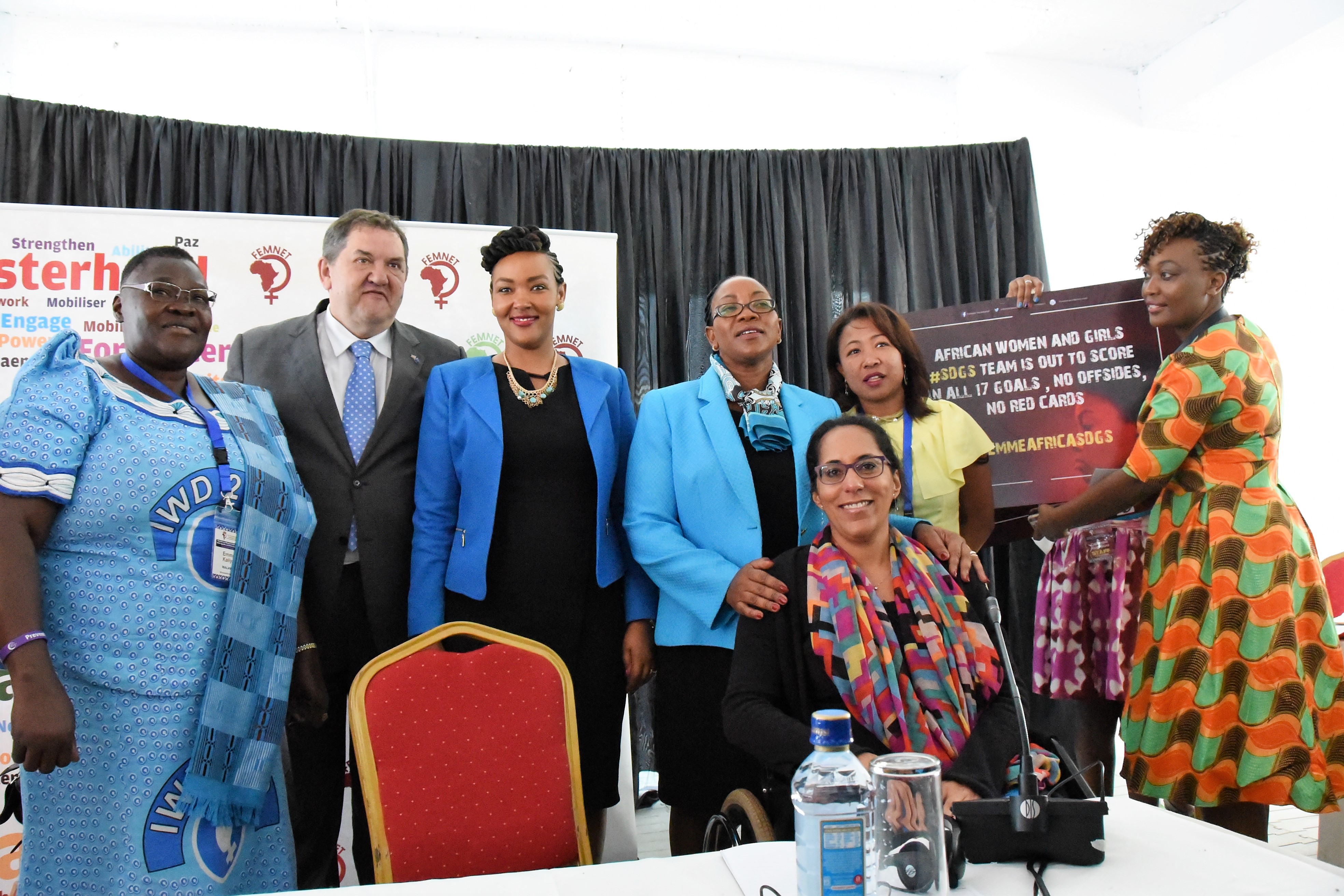African women define the pathway to achieve the SDG's
Date:
Any mention of women and development in the same setting generally conjures up metaphors on feminism—which is precisely the image African Women’s Development and Communication Network (FEMNET) wants to convey.
On May 3rd UN Women welcomed the opportunity from FEMNET to work with representatives of their core constituency - the Women’s Rights Movement among other development partners, during the Safeguarding Our Gains: African women’s collective action in defining the pathway to achieve 2030 Agenda for Sustainable Development (SDGs) & Africa Agenda 2063. This was a dedicated space to spread knowledge and broaden understandings of how to advance gender equality and the empowerment of women within the framework of Africa’s Agenda 2063, the 17 SDGs and particularly, SDG 5 (which is the stand-alone goal on “Achieve gender equality and empower all women and girls”) and highlight the critical role women play.

From left to right: Emma Kaliya, Board Chairperson (FEMNET), Stefano Dejak, European Union Ambassador to Kenya, Dinah Musindarwezo, Executive Director (FEMNET), Cabinet Secretary Sicily Kanini Kariuki, Simone Ellis Oluoch- Olunya, Deputy Regional Director (UN Women Regional Office for Eastern and Southern Africa (ESARO)-, Lana Razafimanantsoa, Executive Director Gasy Youth Up and Memory Kachambwa, Head of Advocacy (FEMNET). Photo: UN Women/Mariam Kouyate
During the plenary session, Hulda Ouma, UN Women ESARO Regional Program Specialist, highlighted the efforts where UN Women in partnership with our partners within the Women’s Rights Movement – globally and regionally, in advancing to both a stand-alone goal on gender equality and women’s empowerment, and the integration of gender-responsive targets and indicators across the other SDGs. Going forward, Hulda Ouma emphasized the fact that the battle is far from won, noting that SDG 5 is the only SDG without time bound targets. The availability of robust comparable gender-specific and sex-dis-aggregated data will be key to strengthening the accountability of government, as well as strategic partnerships across non-traditional sectors in support of our agenda. These will help strengthen the case for and generate increased investment to advance this critical agenda.
Simone ellis Oluoch-Olunya, UN Women ESARO’s Deputy Regional Director said, “The central link between the SDGs and Africa’s Vision 2063 is that both will only be achieved if gender equality and women’s empowerment is prioritized. When women are brought on board to be part of the SDGs implementation, the continent will be able to realize the Agenda 2063 and tackle inequities manifested through poverty, education, access to health services, immigration, disasters, conflict and political discontent that we are witnessing across the continent.” Truly, women’s equality and empowerment are recognized as both the objective and pre-condition to achieving the SDGs.
This conference strategically placed African women to collectively reflect and motivate each other to advance a trans-formative agenda. Women were encouraged to hold their leaders accountable by following up on agreed deliberations. While women and men share, and learn from each other to synergize actions towards advancing Agenda 2030, they should also clearly map out a strategy on their roles. Women issues are complicated. That's why we must be in spaces where we can openly hold discussions and impact on women's empowerment advocacy. Without denying the progressive results this far, SDG 5 is a continuous notion that can be achieved through collective action. Success will now depend on rigorous implementation. “The more we can speak, the more we can see. The more people will be alert,” Gender Cabinet Secretary Sicily Kanini Kariuki said.